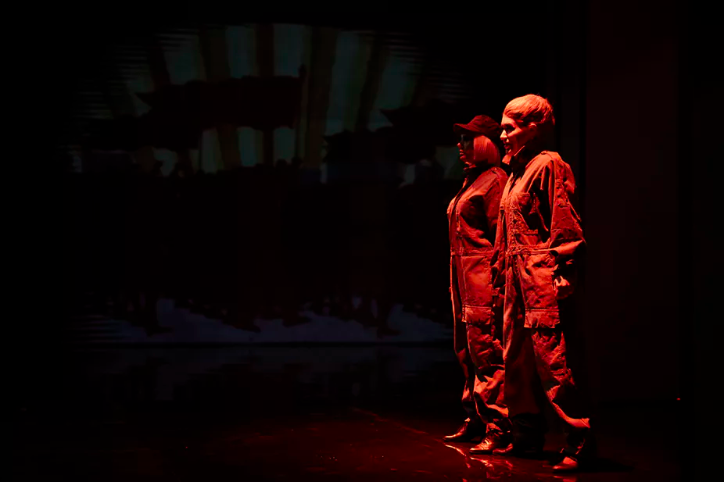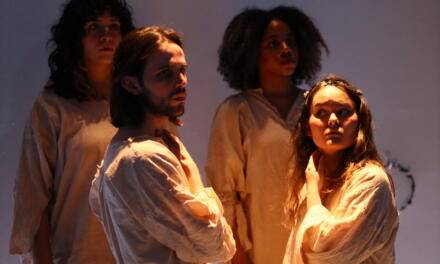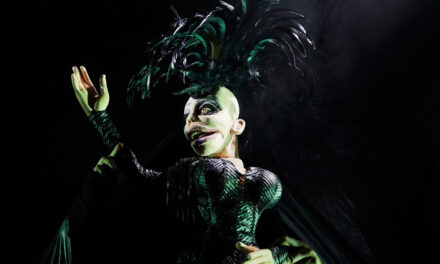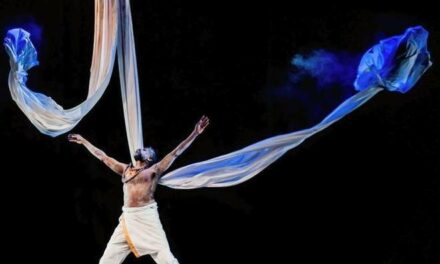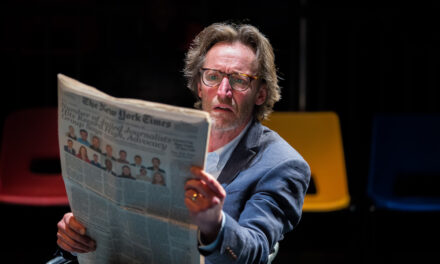“I’m a poet. That’s what makes me interesting.”
So begins the autobiography of Vladimir Mayakovsky, whose futuristic militarisation of poetic verse proved even more revolutionary than the Bolsheviks’ seizure of power in his native Russia.
Mayakovsky composed the bulk of his poems in Moscow, between 1913 and 1930. That fact is enough to imply that our interest in the man’s poetic vocation might also derive from his relation to a very specific historical period and its defining ideology. Any engagement with this poet requires an engagement with communism.
The achievement of Michael Smetanin and Alison Croggon’s new opera, Mayakovsky, now playing at Sydney’s Carriageworks, results from the critical acuity with which it enters that engagement and from how that acuity translates into aesthetic form.
For Smetanin and Croggon, Mayakovsky is a poet whose verse speaks to us now, in our own historical present, as a telegram from an alien future that socialism forecast but which never arrived. Indeed, the opera makes perfectly clear that, unlike the utopia for which Mayakovsky campaigned, ours is a world in which (as one character puts it) “the rich are still rich and the poor are still poor”.
We have been told time and again that Mayakovsky died as a victim of communist savagery.
The tragedy of his suicide, in 1930, is all too frequently recruited as evidence against communism. But it wasn’t the force with which the Bolsheviks sought to eradicate capitalism and establish communism that killed Mayakovsky. He died because the Bolsheviks weren’t forceful enough—because they only engineered the socialist reversal of capitalism’s relations of production, without overcoming those relations altogether. As a poem from 1918 begins:
We seek the future.
We’ve walked across miles of paving blocks.
But we ourselves
have now settled down like a cemetery,
weighed down by the tombstones and palaces.
It was because of a commitment to communism that his poetry demanded more than socialism was ready to offer. The opera’s formal challenge is to recapture this demand in spite of the resignation that usually attends historical hindsight.
A small woodwind and brass ensemble, conducted by Jack Symonds from behind the piano, perform one part of Smetanin’s energetic score. The ensemble’s music is essentially high modernist in its combination of post-romantic and jazz sounds, and that dedication to modernism tips into overt citation by employing one of the period’s favored instruments, the air-raid siren.
The other part of the score is pre-recorded and comprises a cyberpunk soundscape of post-industrial noise and digitized pulsation. The anachronistic frisson that obtains between these two complementary parts of the same score is what makes this opera sonically utopian: from the politically and aesthetically revolutionary moment of 1917, it projects the sci-fi future that Mayakovsky sought to divine in verse.
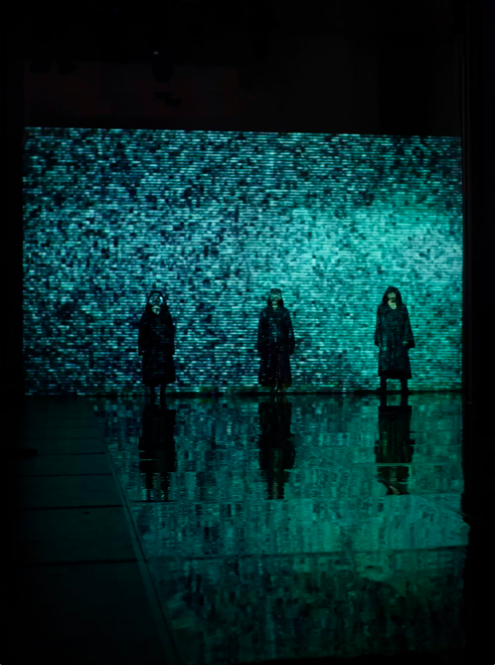
Onstage at Carriageworks. Photo: Zan Wimberley
Another strength is Simon Lobelson’s muscular performance as the eponymous poet.
Lobelson’s portrayal oscillates between nonchalant swagger and explosive intensity; he inhabits every inch of the stage with charismatic gravity and his occasionally thunderous baritone does justice to a poet whose finest work is titled: At the Top of My Voice.
Even if it remains impossible to consciously apprehend the music’s inclusion of a stretched spectral analysis of Mayakovsky’s actual speech, the climactic scene, in which Lobelson belts out in synchrony with a pre-recorded and machinelike vocalization, redoubles the score’s thematic counterpoint and provides bombastic verse the amplification it deserves.
Though it might seem churlish to point out flaws in such an excellent production, one might be forgiven for suggesting it overemphasizes the tumultuous affair between Mayakovsky and his bohemian lover, Lilya Brik.
This narrative distracts from the more compelling and persistent exploration of what it means to be a revolutionary poet in the aftermath of revolution. Nonetheless, the distraction rewards by foregrounding Jessica O’Donoghue’s sensational performance as Lily and by granting a fantastical episode in which Mayakovsky romances her with lines from A Cloud in Pants.
Theirs is a passion tempered by revolution, and Croggon’s libretto does a fine job capturing this. It is anything but bourgeois sentimentalism.
Towards the end of Act One, soon after a spirited staging of the Russian Revolution, the Author (a meta-character played by Brenton Spiteri) interjects that 1917 was a time when radicals could maintain their idealism without irony. In this peculiar role, the Author presents himself as the cynical voice of capitalist realism, a regression of the current age.
In other plays, this would be a signal for the audience to remain vigilant against enthusiasm for any sort of serious utopian project. But not here. Instead, Mayakovsky proceeds to not only contradict the reactionary Author, he also dominates him, by dragging him around the stage; by singing louder and deeper; and, finally, by executing him against the wall.
Some will take umbrage at the brutality of this final gesture, not least because it avoids the pitiful cliché of caricaturing suicidal poets as beautiful souls, isolated from the political realities their precious art should resist.
It is worth remembering that if Mayakovsky is interesting because he was a poet, his poetry remains political to the core, and it was just as militant about revolutionary terror as the Bolsheviks. So he wrote in 1918:
It’s high time
for bullets
to tinkle across museum walls.
Fire on the older order with the hundred-inch guns of your gullets!
Sow death in the enemy’s camp.
Don’t let us catch you, hirelings of capital.
This post originally appeared on The Conversation on July 31, 2014, and has been reposted with permission.
This post was written by the author in their personal capacity.The opinions expressed in this article are the author’s own and do not reflect the view of The Theatre Times, their staff or collaborators.
This post was written by Mark Steven.
The views expressed here belong to the author and do not necessarily reflect our views and opinions.

